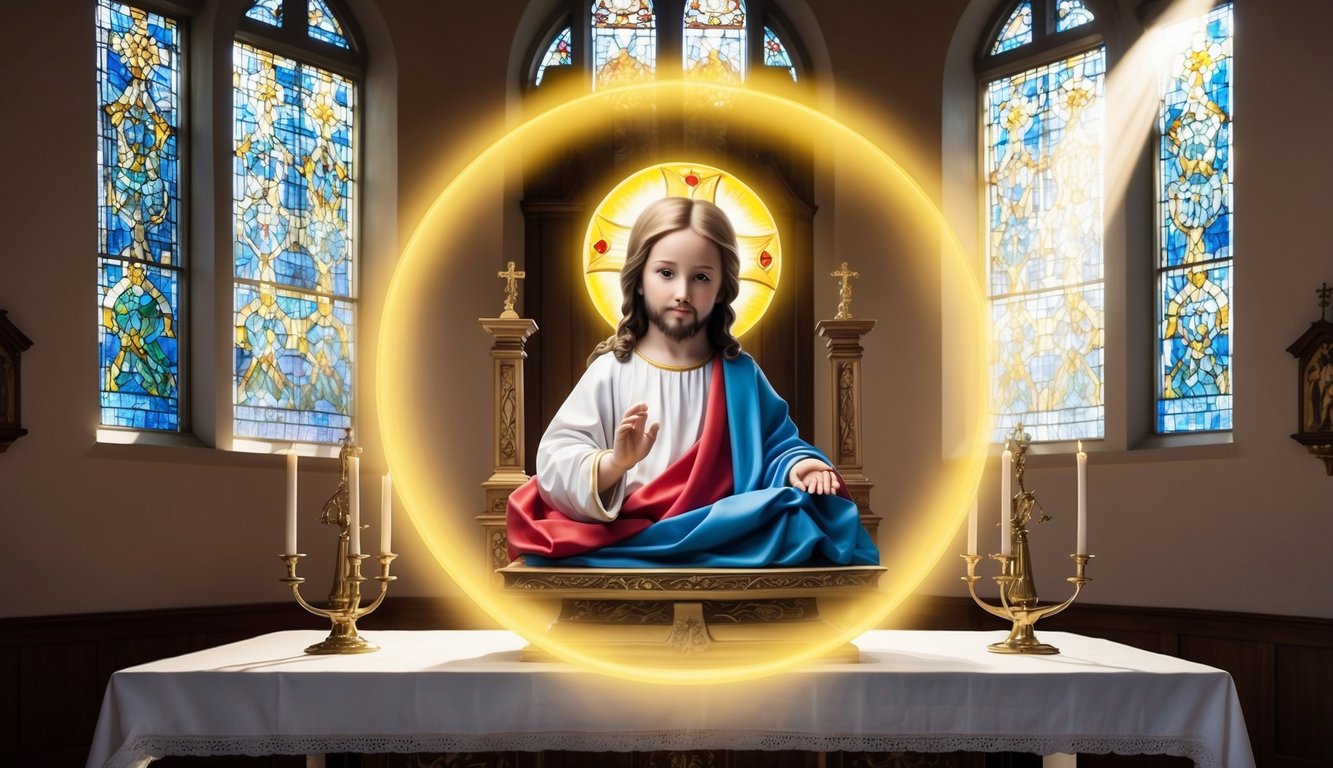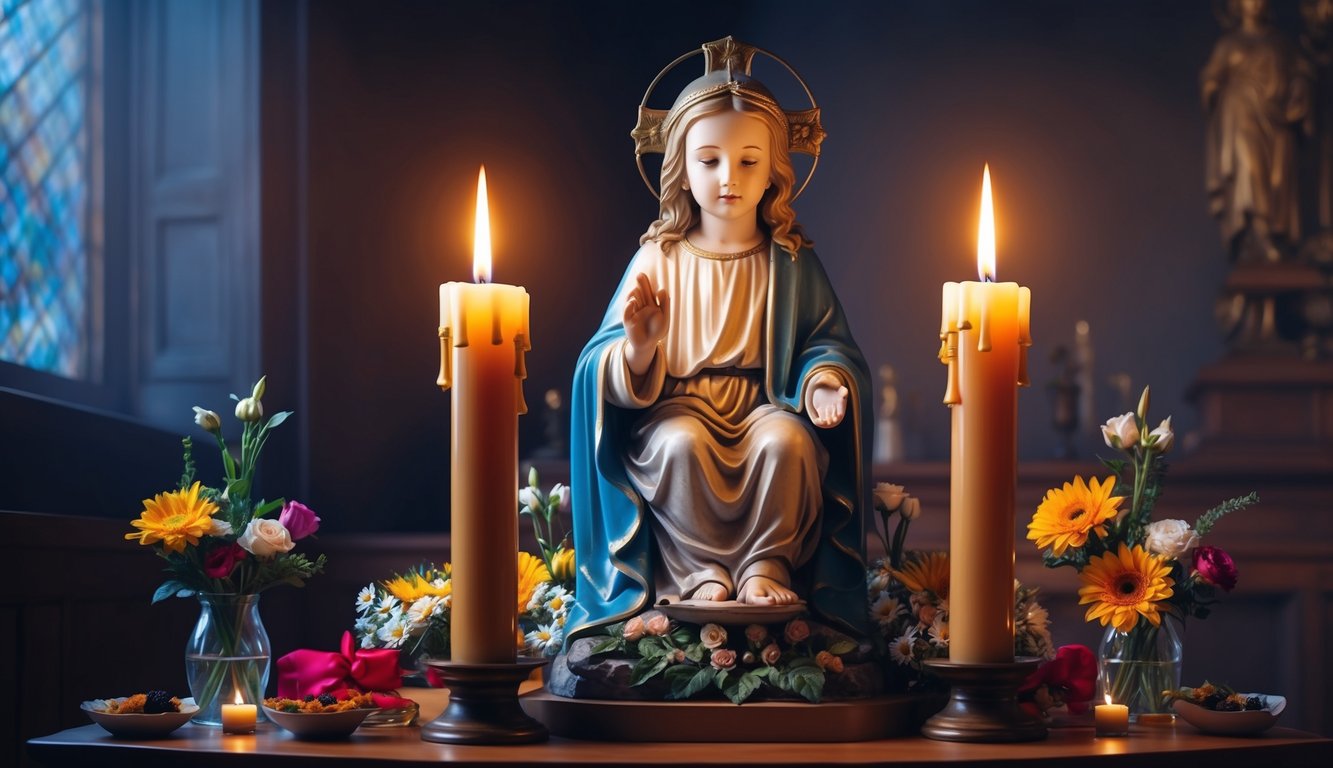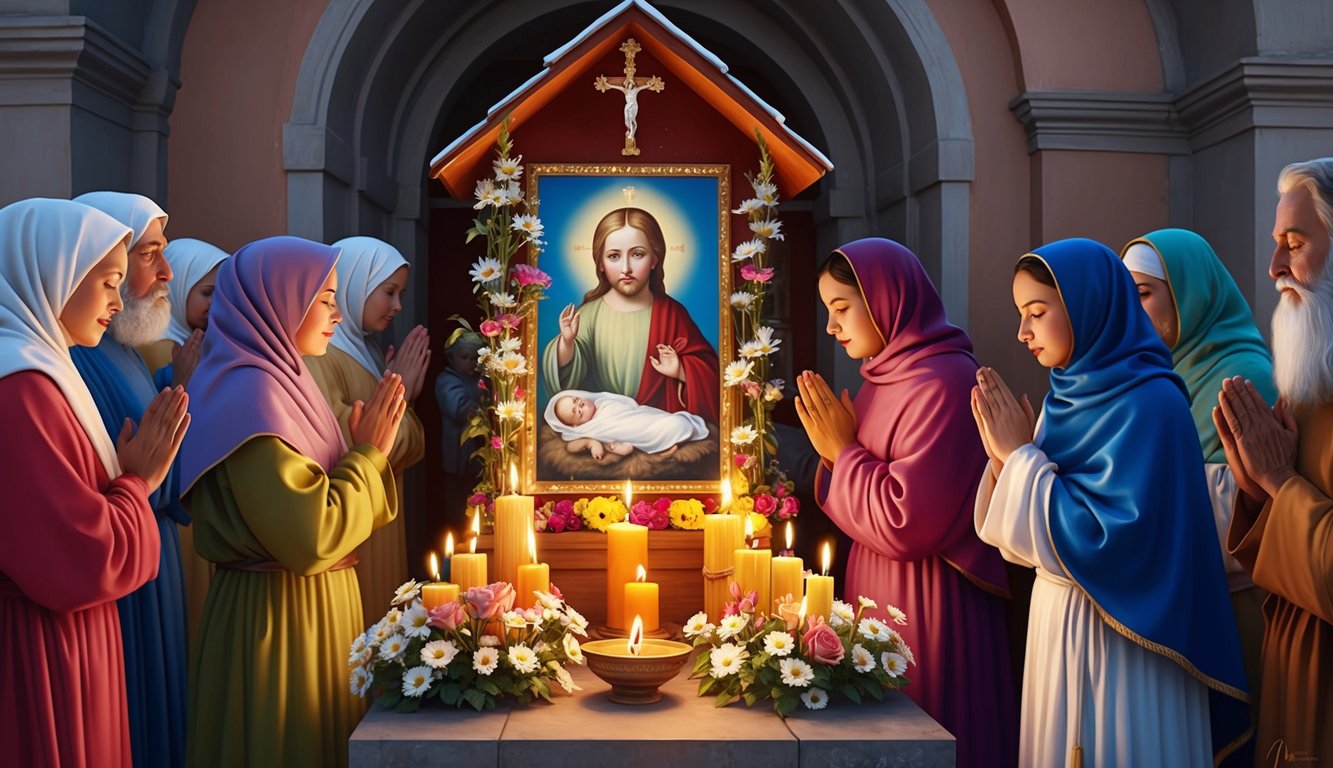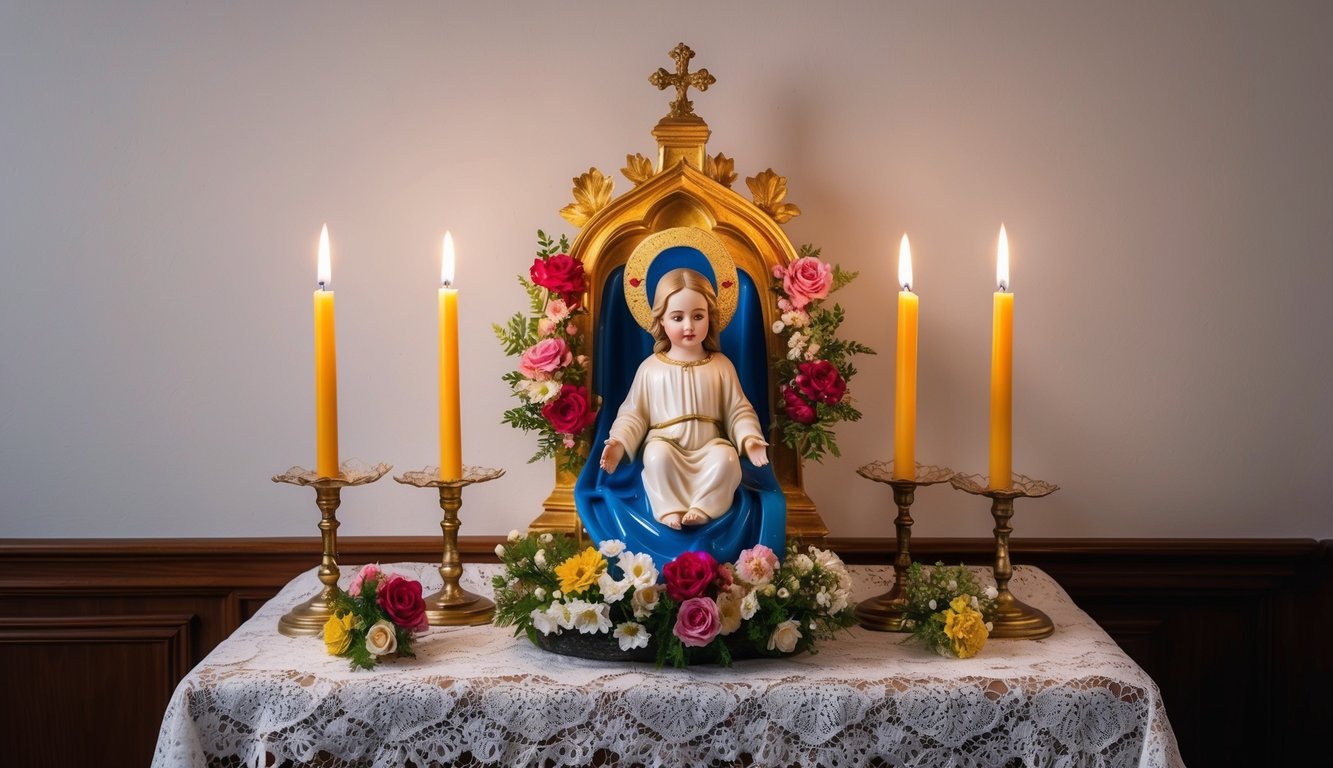Don’t Miss Out On This Unique Astrological Opportunity
Are you tired of spinning your wheels and getting nowhere? Simply put, you’re out of sync: you’re out of alignment with your astral configuration.
But: there’s a kind of map that can help you reclaim your alignment. Think of it as your own personal blueprint to success and happiness: a blueprint that will help you live your most amazing life.
Get started here.
Have you ever wondered about the powerful devotion found in the novena to the Infant Jesus of Prague? This special series of prayers is deeply rooted in Christian faith, offering hope and comfort to many.
As you explore this devotion, you’ll discover its connection to the history and traditions of the Catholic Church.
The Infant Jesus of Prague, represented as a kingly child, is a symbol of innocence and divine power, moving the hearts of those who seek His help.
The novena to the Infant Jesus of Prague invites you to participate in a nine-day prayer journey, seeking blessings for various life challenges.
Whether you are facing difficulties or simply wish to deepen your spiritual life, this novena can be a source of strength and guidance.
Many devotees turn to this powerful devotion to find comfort and hope in times of need.
The novena for healing is especially cherished by those seeking physical, emotional, or spiritual restoration.
Through heartfelt prayer and trust in the Infant Jesus, believers open themselves to divine grace and encouragement.
Many people find solace in this devotion, believing that the prayers bring them closer to Jesus and His miraculous works.
The deep veneration of the Infant Jesus of Prague highlights the importance of faith and trust in divine providence.
The statue of the Infant Jesus, often associated with miraculous events, stands as a reminder of unwavering belief in the face of adversity.
By engaging with this devotional practice, you embrace a tradition that resonates with countless believers around the world, finding peace and fulfillment in your spiritual journey.
History and Significance
The Novena to the Infant Jesus of Prague is a cherished tradition within the Catholic Church.
This devotion centers on a statue of Jesus as a child, believed to bring blessings and miracles.
Both historical and religious elements play a role in its widespread veneration today.
The Origins
The statue of the Infant Jesus of Prague traces back to the early 17th century.
It was a gift from a Spanish noblewoman to the Carmelites in Prague.
Over time, the Carmelites began to turn to the statue during turbulent periods, attributing many miracles to it.
The Carmelite devotion to the Infant Jesus became an important part of their spiritual practices.
The statue’s fame grew, drawing pilgrims seeking divine intervention and favor.
Veneration and Feast Day
The Infant Jesus of Prague is venerated worldwide, with a special devotion on January 14th.
This feast day celebrates the statue’s mysterious charm and miraculous reputation.
On this day, the statue is often paraded through the streets as part of lively and colorful processions.
Devotees from various backgrounds gather to celebrate and ask for the blessings of the Miraculous Infant Jesus.
The Catholic Church embraces this devotion, enhancing its reach and significance across different regions.
The Novena Prayer
When you participate in a novena to the Infant Jesus of Prague, you engage in a meaningful tradition that blends prayer with reflection.
Each day brings its own focus and heartfelt petitions.
Structure of the Novena
The novena is typically structured over a period of nine days.
You begin with the “O Jesus” invocation, followed by familiar prayers like the Our Father, the Hail Mary, and the Glory Be.
These prayers form the backbone of your spiritual journey each day.
The repetition of these prayers creates a rhythm.
This rhythm allows you to meditate deeply on your intentions and your devotion to the Infant Jesus.
Each day, you spend time in prayer and reflection, strengthening your connection with your faith.
Day-by-Day Reflection
As you progress through the novena, each day offers a unique focus.
- Day 1 often centers on faith, while Day 2 might guide your thoughts towards compassion.
- Moving forward, Day 3 can be about thanksgiving, inviting you to express gratitude.
- Day 4 encourages contemplation on humility.
During Day 5, consider mercy, while Day 6 can invite hope into your heart.
As you reach Day 7, delve into reflections on divine love. Day 8 often turns to perseverance, before concluding on Day 9 with thoughts about eternal happiness.
These reflections help anchor your prayers and ensure that each day leads to meaningful spiritual growth.
Spiritual Benefits

Engaging in the Novena to the Infant Jesus of Prague can bring numerous spiritual benefits to your life.
It offers promises of peace, joy, and miracles that strengthen your faith and bring comfort to your heart.
Promises Attached to the Devotion
One of the notable aspects of the Novena to the Infant Jesus of Prague are the promises associated with it.
Devotees believe that these include promises of peace and blessings.
Many who practice this devotion speak of experiencing profound mercy and grace in their lives.
This devotion also brings a deep sense of hope and love, encouraging you to trust in God’s plan.
It is believed that miracles can happen through prayer, as illustrated in the lives of many believers who have witnessed positive changes or healing.
Personal Reflections on the Novena
Your personal journey with the Novena to the Infant Jesus of Prague can be a source of immense joy and peace.
By sincerely praying and meditating on the life of Jesus, you invite His love and grace into your heart.
Many people reflect on these prayers, finding a deep sense of trust and hope in their spiritual path.
These reflections often highlight moments where you can feel God’s presence and mercy washing over your life.
By connecting with these spiritual aspects, your faith can grow stronger, and a sense of inner calm and contentment can be achieved.
This journey helps you appreciate the small miracles and blessings that unfold each day.
Living the Devotion

Living the devotion to the Infant Jesus of Prague involves expressing love and mercy through your actions and celebrations.
Participating in this devotion allows you to honor and praise the divine savior, nurturing a heart full of love and gratitude.
Acts of Love and Mercy
Engaging in acts of love and mercy is a significant part of living this devotion.
You can start by incorporating the Infant of Prague Novena Prayer into your daily routine.
This prayer invites you to seek divine intercession and express love toward others.
Helping those in need is another way to show mercy.
Whether through volunteering at a local shelter or offering support to a friend, these acts reflect the compassion of divine Jesus.
Participating in community activities can also strengthen your bond with others, emphasizing love and mercy in daily life.
Through these actions, you honor the teachings of Christ and bring warmth to those around you.
Celebrating the Feast of the Infant Jesus
Celebrating the Feast of the Infant Jesus on January 5 allows you to focus on gratitude and thanksgiving.
Attend a Mass to experience the community’s shared devotion.
During the feast, many people express their devotion by sharing meals with loved ones or engaging in heartfelt prayer.
A Prayer of Thanksgiving can be a beautiful addition, offering thanks to the divine savior for blessings received.
Decorating your home with symbols of the Infant Jesus, such as small statues or candles, can bring the spirit of the feast into your daily surroundings.
These celebrations nurture a feeling of joy and honor, reflecting the loving nature of this devotion.
Additional Prayers and Practices

When engaging in the novena to the Infant Jesus of Prague, there are specific prayers and practices that can enrich your experience.
These include litanies and acts of consecration, as well as daily invocations.
Litanies and Acts of Consecration
Litanies are a common practice through which you can seek the intercession of Mary and the Holy Name of Jesus.
Reciting these litanies allows you to honor the divine qualities of the Child Jesus.
Acts of consecration involve dedicating yourself to the Infant Jesus and the Most Holy Mother, seeking their guidance and protection.
Such consecrations can act as a pledge to live according to Christian values.
They focus on themes like freedom from want and aspiring to the kingdom of heaven.
Performing these acts regularly during your novena can deepen your connection to these spiritual ideals.
Daily Invocations
Including daily invocations in your prayer routine can offer you a sense of continuity and devotion.
Invocations usually involve short, heartfelt prayers that invite the presence of the Holy Name of Jesus into your daily life.
These prayers can be simple, asking for strength or protection.
They are especially meaningful during Lent when reflections on poverty and sacrifice are prevalent.
Daily invocations help you invite divine guidance, promoting spiritual growth and indulgence in grace through every stage of life.
Including these prayers consistently can enhance your spiritual journey and focus on your personal aspirations.



